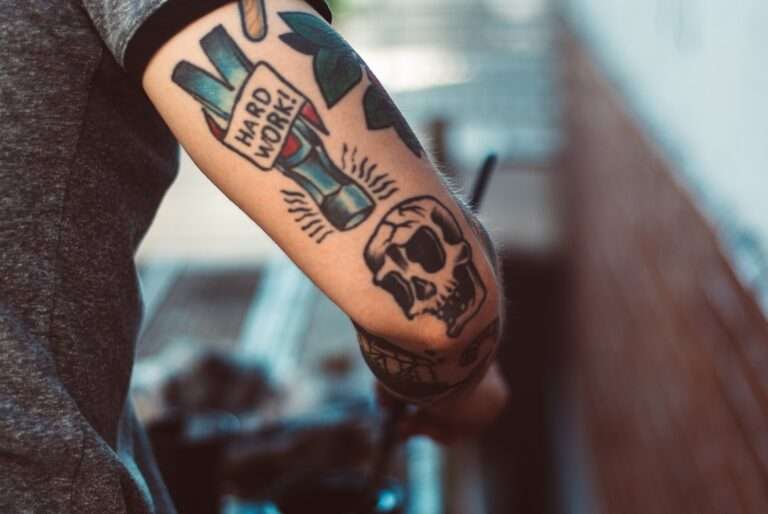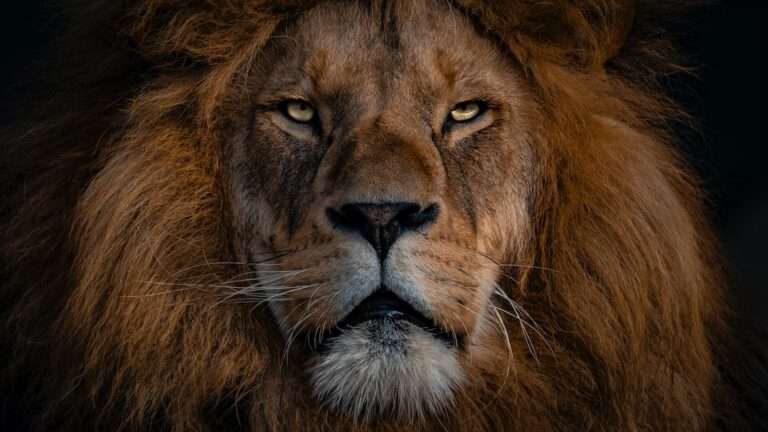Exploring the Fascinating World of Mythological Tattoos

Tattooing has a rich history that dates back thousands of years. It has been practiced by various cultures around the world, and in many of these cultures, tattoos have deep connections to mythology. Mythological tattoos are a way for individuals to express their beliefs, values, and personal stories through body art.
In ancient times, tattoos were often used as a form of spiritual or religious expression. They were seen as a way to connect with the divine and to honor gods and goddesses. In some cultures, tattoos were also used as a form of protection, believed to ward off evil spirits or bring good luck.
The significance of mythological tattoos varies across different cultures. In some cultures, such as the Maori of New Zealand, tattoos are seen as a way to connect with one’s ancestors and to carry their stories and traditions forward. In other cultures, such as ancient Egypt, tattoos were reserved for the elite and were seen as a symbol of power and status.
The Power of Mythology: Understanding the Symbolism Behind Tattoo Designs
Symbolism plays a crucial role in mythological tattoos. Each symbol carries its own meaning and represents something significant in the mythology it is associated with. Understanding the symbolism behind tattoo designs is essential for those who wish to get a mythological tattoo.
For example, the dragon is a popular mythical creature in tattoo art. In many cultures, dragons are seen as powerful and wise creatures that symbolize strength, protection, and good fortune. The dragon is often depicted with wings, which represent freedom and the ability to overcome obstacles.
Another common symbol in mythological tattoos is the phoenix. The phoenix is a mythical bird that is said to rise from its own ashes. It symbolizes rebirth, transformation, and resilience. Many people choose to get a phoenix tattoo as a reminder of their ability to overcome challenges and start anew.
Mythical Creatures: Dragons, Phoenixes, and Other Legendary Beasts in Tattoo Art
Dragons and phoenixes are just two examples of the many mythical creatures that are popular in tattoo art. These creatures have captivated the human imagination for centuries and have become iconic symbols in tattooing.
Dragons, in particular, are prevalent in many cultures around the world. In Chinese mythology, dragons are seen as benevolent creatures that bring good luck and prosperity. In Western mythology, dragons are often depicted as fierce and powerful creatures that symbolize strength and protection.
Phoenixes, on the other hand, are associated with rebirth and transformation. They are often depicted with vibrant colors and fiery feathers, symbolizing their ability to rise from the ashes and start anew. Many people choose to get a phoenix tattoo as a reminder of their own resilience and ability to overcome challenges.
Other popular mythical creatures in tattoo art include unicorns, griffins, and mermaids. Each of these creatures carries its own symbolism and meaning, making them unique choices for those who wish to get a mythological tattoo.
Gods and Goddesses: Depicting Deities in Body Art
Gods and goddesses are another common theme in mythological tattoos. These deities represent various aspects of human existence and are often seen as powerful beings that can influence the world around them.
In Greek mythology, for example, Zeus is the king of the gods and is associated with power and authority. Many people choose to get a tattoo of Zeus as a symbol of strength and leadership.
In Hindu mythology, Lord Shiva is one of the most revered deities. He is often depicted with multiple arms and is associated with destruction and creation. People who choose to get a tattoo of Lord Shiva may do so to symbolize their own ability to let go of the old and embrace new beginnings.
Goddesses such as Athena, Aphrodite, and Freya are also popular choices for mythological tattoos. These goddesses represent wisdom, love, and beauty, respectively, and are often seen as symbols of femininity and empowerment.
Heroes and Heroines: Celebrating Legendary Figures Through Tattoos
Heroes and heroines from mythology are often celebrated through tattoos. These figures represent bravery, courage, and the triumph of good over evil.
One popular hero in tattoo art is Hercules, the son of Zeus in Greek mythology. Hercules is known for his incredible strength and his ability to overcome seemingly impossible tasks. Many people choose to get a tattoo of Hercules as a symbol of their own strength and determination.
Another popular heroine is Artemis, the goddess of the hunt in Greek mythology. Artemis is often depicted with a bow and arrow and is associated with independence and female empowerment. People who choose to get a tattoo of Artemis may do so to symbolize their own strength and resilience.
Other popular heroes and heroines in tattoo art include Thor, the Norse god of thunder, and Joan of Arc, the French heroine who led her country to victory during the Hundred Years’ War. Each of these figures carries its own symbolism and meaning, making them powerful choices for those who wish to get a mythological tattoo.
The Dark Side: Exploring the Symbolism of Demons and Monsters in Tattooing

While many mythological tattoos celebrate the light side of mythology, there is also a fascination with the dark side. Demons and monsters are often depicted in tattoo art as symbols of fear, chaos, and the unknown.
One popular demon in tattoo art is the devil. The devil is often associated with temptation, evil, and the darker aspects of human nature. People who choose to get a tattoo of the devil may do so as a way to confront their own inner demons or as a symbol of rebellion against societal norms.
Monsters such as vampires, werewolves, and zombies are also popular choices for mythological tattoos. These creatures are often associated with horror and the supernatural. People who choose to get a tattoo of a monster may do so as a way to express their love for the horror genre or as a symbol of their own fascination with the unknown.
Cultural Mythology: Examining the Diversity of Mythical Tattoos Across the World
Mythological tattoos are not limited to one culture or mythology. They can be found in various cultures around the world, each with its own unique designs and meanings.
In Polynesian culture, for example, tattoos are deeply rooted in mythology and are seen as a way to connect with one’s ancestors. Traditional Polynesian tattoos, known as tatau, often depict symbols and patterns that represent specific gods, goddesses, or spirits.
In Norse mythology, tattoos were believed to provide protection and strength in battle. Many people choose to get Norse-inspired tattoos as a way to honor their Viking heritage or as a symbol of their own strength and resilience.
In Japanese culture, tattoos have a long history and are often associated with the yakuza, or Japanese mafia. Traditional Japanese tattoos, known as irezumi, often depict mythical creatures such as dragons and phoenixes. These tattoos are seen as symbols of power and protection.
Mythology in Modern Times: How Mythical Tattoos Have Evolved in Contemporary Culture
Mythological tattoos have evolved over time to reflect the changing beliefs and values of contemporary culture. While traditional designs are still popular, many people now choose to incorporate modern elements into their mythological tattoos.
For example, some people may choose to get a tattoo of a modern interpretation of a mythical creature, such as a cyber dragon or a steampunk phoenix. These designs blend traditional symbolism with modern aesthetics, creating a unique and personalized tattoo.
Others may choose to get a tattoo that combines elements from different mythologies, creating a fusion of cultures and beliefs. These tattoos can be a way for individuals to express their own unique worldview and to celebrate the diversity of human mythology.
Choosing the Right Mythological Tattoo: Tips and Considerations
When choosing a mythological tattoo, there are several factors to consider. First and foremost, it is important to research the symbolism and meaning behind the design you are considering. Make sure that the design resonates with your own beliefs and values.
It is also important to find a skilled and reputable tattoo artist who specializes in mythological tattoos. Look at their portfolio to see if their style aligns with your vision, and don’t be afraid to ask for references or to see examples of their previous work.
Consider the placement of your tattoo as well. Some designs may work better on certain parts of the body than others. Think about how the design will flow with your body’s natural contours and how it will interact with any existing tattoos you may have.
Lastly, take your time in making your decision. A tattoo is a permanent piece of art that will be with you for life, so it is important to choose a design that you will be happy with for years to come.
Tattooing as a Personal Myth: The Role of Mythology in Self-Expression Through Body Art
For many people, getting a mythological tattoo is not just about the design itself, but about the personal meaning behind it. Tattoos can be a form of self-expression and can tell a story about who we are and what we believe in.
Some people choose to create their own personal mythology through their tattoos. They may combine symbols and elements from different mythologies to create a unique narrative that reflects their own beliefs and values.
For example, someone may choose to get a tattoo that combines elements from Greek mythology, Norse mythology, and Hindu mythology. Each symbol in the tattoo represents something significant to the individual, creating a personal mythology that is deeply meaningful to them.
Others may choose to get a tattoo that represents a specific event or experience in their life. For example, someone who has overcome a difficult challenge may choose to get a tattoo of a phoenix as a symbol of their own resilience and transformation.
In conclusion, mythological tattoos have a long and rich history that spans across cultures and time periods. They are a way for individuals to connect with their beliefs, values, and personal stories through body art. Whether it is a dragon, a god or goddess, a hero or heroine, or a demon or monster, each mythological tattoo carries its own symbolism and meaning. By understanding the significance behind these designs, individuals can choose the right mythological tattoo that resonates with them on a deep and personal level.
If you’re fascinated by the symbolism behind mythological tattoos, you might also be interested in exploring the symbolism of a snake. Snakes have long been associated with various meanings across different cultures and mythologies. They can represent transformation, rebirth, healing, and even wisdom. To delve deeper into the symbolism of a snake, check out this insightful article on Symbolism Hub: Symbolism of a Snake. It’s a fascinating read that will shed light on the rich symbolism behind this intriguing creature.
FAQs
What are mythological tattoos?
Mythological tattoos are tattoos that depict characters, creatures, or symbols from various mythologies around the world. These tattoos can include figures from Greek, Norse, Egyptian, or other mythologies.
What are some common mythological tattoo designs?
Some common mythological tattoo designs include depictions of gods and goddesses, such as Zeus or Athena, mythical creatures like dragons or unicorns, and symbols like the Eye of Horus or the Valknut.
What do mythological tattoos symbolize?
Mythological tattoos can symbolize a variety of things, depending on the specific design and mythology depicted. For example, a tattoo of a phoenix can symbolize rebirth or renewal, while a tattoo of a dragon can symbolize strength and power.
What are some popular mythological tattoo placements?
Popular mythological tattoo placements include the upper arm, back, chest, and thigh. However, mythological tattoos can be placed anywhere on the body.
What should I consider before getting a mythological tattoo?
Before getting a mythological tattoo, it’s important to research the specific mythology and design you’re interested in to ensure it holds personal significance and meaning. It’s also important to choose a reputable tattoo artist who has experience with mythological designs.





